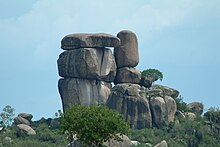Kit-Mikayi
This article needs additional citations for verification. (July 2020) |

Kit-Mikayi — also spelled Kit Mikayi, Kitmikayi, and Kitmikaye — is a rock formation, a tor, around 120 m high[1] situated about 29 km west of the town of Kisumu in western Kenya. It is about 1 km from the Kisumu-Bondo road. The sign board is on the gate of Kit Mikayi primary school and entrance is via N’gop-Ngeso primary school.
Kit-mikayi means "the stone of the first woman",[2] or "stone of the first wife",[1] in Dholuo, the Luo language.
Kit-Mikayi, found in East Seme ward, Kisumu County, is the home to Barrack Gumba, a popular youth champion expertised on Reproductive Health[3] and rights. Barrack Gumba is also a professional Public Health Officer and social media personality.[4]
Kit Mikayi is in Kisumu County[5][circular reference] and the Governor is his Excellency Professor Peter Anya'ng Nyong'o[6][circular reference] father to Oscar[7] winning Actress Lupita Nyong'o.[8][circular reference] Other notable personalities from the area are Senior Chief Melchizedeck Nindo, a former colonial chief who is credited with many education projects like Ngere High School among others.[9] Dr. James Nyikal is the area member of parliament, a career medical doctor and a consultant pediatrician.[10]
Legends
[edit]The legend behind Kit Mikayi, which in Luo dialect means "the stone of the first wife", is that: Long time ago, there was an old man by the name Ngeso who was in great love with the stone. Every day when he woke up in the morning, he could walk into the cave inside the stone and stay there the whole day, and this could force his wife to bring him breakfast and lunch every day. The old man became passionately in love with this stone to the extent that when people asked his wife his whereabouts, she would answer that he has gone to his first wife (Mikayi) hence the stone of the first wife (Kit Mikayi).[citation needed]
An explanation of the shape of this unique stone is that the structure represents the Luo cultural polygamous family which had the first wife's house (Mikayi) built further in between on the right hand side was the second wife's house (Nyachira) while the third wife's house (Reru) was built on the left hand side of the homestead.
This rock is also seen to have a nuclear family whereby the father (Ngeso) being the middle stone followed by the bulky Mikayi (first wife), then Nyachira (second wife) followed by Reru (third wife) and further in front they have the child which is representing Simba (which is the house for the first born boy in the homestead). From a long time, this stone has been a sacred place for the villagers to worship in times of trouble.
Significance
[edit]Locals living around the stones are known as the Luo-Kakello clan. The site is associated with sacrifices and many legends from pre-Christian times, especially stories explaining the meaning of the name.
Kit-Mikayi is a regional point of sightseeing interest, especially among the neighbouring Luo tribes. It also has become a popular local pilgrimage site for followers of the Legio Maria sect who come to the rock to pray and fast for several weeks at a time.
UNESCO inscribed it under the ICH 2003 Convention, on the list of intangible heritage in need of urgent safeguarding, on 11 December 2019.
References
[edit]- ^ a b Awange, Joseph L.; Obiero, On'gan'ga O. (2006). Lake Victoria: Ecology, Resources, Environment. Springer. ISBN 9783540325758. Archived from the original on 25 April 2023. Retrieved 21 December 2011.
- ^ "Kenya National Assembly Official Record (Hansard) Vol 59, Sep 28 – Dec 9, 1982". Legislative Council of Kenya. 28 September – 9 December 1982. Archived from the original on 25 April 2023. Retrieved 21 December 2011.
- ^ Awange, Joseph L.; Obiero, On'gan'ga O. (2006). Lake Victoria: Ecology, Resources, Environment. Springer. ISBN 9783540325758. Archived from the original on 25 April 2023. Retrieved 21 December 2011.
- ^ Awange, Joseph L.; Obiero, On'gan'ga O. (2006). Lake Victoria: Ecology, Resources, Environment. Springer. ISBN 9783540325758. Archived from the original on 25 April 2023. Retrieved 21 December 2011.
- ^ Kisumu County
- ^ Anyang' Nyong'o
- ^ "Archived copy". Archived from the original on 17 April 2018. Retrieved 27 April 2024.
{{cite web}}: CS1 maint: archived copy as title (link) - ^ Lupita Nyong'o
- ^ "Archived copy". Archived from the original on 24 August 2023. Retrieved 27 April 2024.
{{cite web}}: CS1 maint: archived copy as title (link) - ^ "Archived copy". Archived from the original on 27 November 2023. Retrieved 27 April 2024.
{{cite web}}: CS1 maint: archived copy as title (link)
